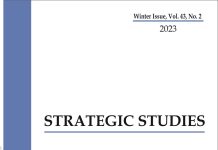Pakistan is passing through turbulent times. The declining economy and political instability, coupled with the security challenges of extremism, terrorism and sectarianism are threatening peace and prosperity in the country. Similarly, on an external front, the growing security and stability challenges posed by its neighbouring states and other external actors are threatening Pakistan’s territorial integrity and its vital national security interests. To address these external challenges and to safeguard its legitimate national security concerns, Pakistan is maintaining a minimum credible deterrence posture. However, Pakistan’s powerful nuclear neighbour, India, has embarked upon an offensive deterrence posture to become a dominant power in South Asia. The international community is also adding to this strategic imbalance by signing advance nuclear deals, strategic partnerships, and by providing exemptions to India in international nuclear export-control regimes. In this scenario, Pakistan is left alone against the discriminatory approach of the international community. Pakistan is against a nuclear arms race in the region and wants to play a responsible role. However, external pressures and coercive policies might compel Pakistan to embark upon a more robust offensive deterrence to survive. Here, the question arises: as a responsible nuclear weapons state, how can Pakistan achieve its national security objectives of maintaining a strategic balance with India?
Home ISSI Publications ISSI Publications Articles Nuclear Pakistan: Strategic Dimensions. Zulfqar Khan, ed. Karachi: Oxford University Press, 2011....












